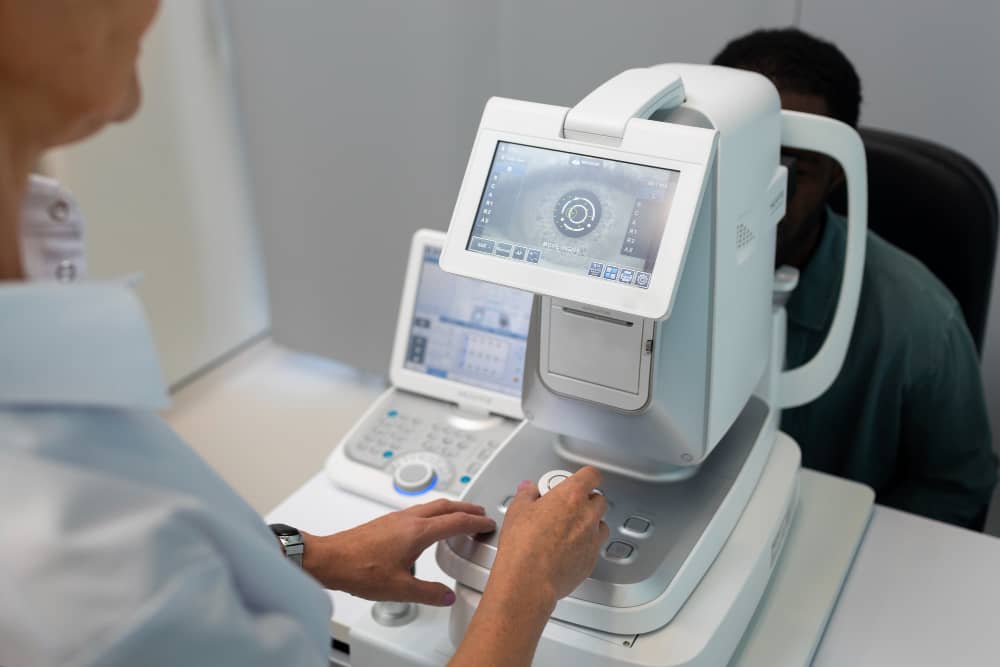Technology is rapidly transforming the field of ophthalmology, offering new tools and techniques to diagnose and treat eye conditions with greater accuracy and efficiency. This raises an important question: Is technology reducing negligence in ophthalmology? While technology offers immense potential to improve patient safety and reduce errors, it also introduces new challenges and considerations. Let’s explore the complex relationship between technology and negligence in ophthalmology.
The Promise of Technology in Ophthalmology
Technological advancements hold significant promise for minimising negligence in ophthalmology. Artificial intelligence (AI) is playing an increasingly important role in the detection and diagnosis of eye diseases. AI-powered tools can analyse medical images, such as retinal scans, with remarkable accuracy, often surpassing human capabilities. This can lead to earlier and more accurate diagnoses of conditions like diabetic retinopathy, glaucoma, and age-related macular degeneration, allowing for timely intervention and better outcomes for patients.
Telemedicine is another technological advancement transforming eye care. It allows patients to consult with ophthalmologists remotely, increasing access to care, especially for those in remote or underserved areas. Teleophthalmology can facilitate early detection of eye diseases through remote screenings and monitoring, potentially reducing the risk of vision loss due to delayed diagnosis or treatment.
Electronic Health Records (EHRs) are also crucial in reducing medical errors and improving patient safety. EHRs provide a centralised repository of patient information, including medical history, allergies, and current medications, which can be easily accessed by healthcare providers. This seamless sharing of information can help prevent medication errors, avoid duplicate testing, and ensure that patients receive appropriate and coordinated care.
The Potential Pitfalls of Technology
While technology offers significant benefits, it’s essential to acknowledge the potential pitfalls and challenges associated with its implementation in ophthalmology. One concern is the risk of over-reliance on technology. While AI and other technological tools can aid in diagnosis and treatment, they should not replace the clinical judgment and expertise of ophthalmologists. It’s crucial for healthcare professionals to use technology judiciously and to maintain a critical eye when interpreting results.
Another challenge is ensuring the accuracy and reliability of AI algorithms. AI models are trained on large datasets, and if these datasets are biased or incomplete, the algorithms may produce inaccurate or misleading results. This highlights the importance of rigorous validation and ongoing monitoring of AI tools to ensure their safety and effectiveness.
The increasing use of technology in ophthalmology also raises ethical and legal considerations. Issues such as data privacy, informed consent, and the potential for algorithmic bias need to be carefully addressed to ensure that technology is used responsibly and ethically.
The Human Factor in Ophthalmology
Despite the advancements in technology, the human factor remains crucial in ophthalmology. Technology can augment and enhance the capabilities of ophthalmologists, but it cannot replace the essential elements of human interaction, empathy, and clinical judgment. Effective communication between healthcare providers and patients is vital for building trust, understanding patient needs, and ensuring adherence to treatment plans.
Furthermore, technology can sometimes create new avenues for errors. For example, the use of electronic systems can introduce the risk of data entry errors or system malfunctions. It’s essential for healthcare professionals to be vigilant and to have safeguards in place to prevent and mitigate such errors.
Striking a Balance: Technology and Human Expertise
The key to reducing negligence in ophthalmology lies in striking a balance between technology and human expertise. Technology should be viewed as a tool to enhance the capabilities of ophthalmologists, not as a replacement for their clinical judgment and skills. By integrating technology thoughtfully and responsibly, ophthalmologists can improve the accuracy and efficiency of care while maintaining the essential elements of human interaction and compassion.
The Role of Training and Education
To ensure the safe and effective use of technology in ophthalmology, ongoing training and education are essential. Ophthalmologists need to be equipped with the knowledge and skills to utilise technology effectively and to interpret results accurately. They also need to be aware of the potential limitations and biases of AI and other technological tools.
Continuing medical education programs and professional development initiatives should incorporate training on the latest technological advancements and their implications for ophthalmic practice. This will help ensure that ophthalmologists remain at the forefront of innovation while maintaining the highest standards of patient care.
Making a Medical Negligence Claim with National Claims
At National Claims, we understand the devastating impact that medical negligence can have on your life and the lives of your loved ones. If you believe you or a family member has suffered harm due to substandard medical care, such as misdiagnosis, surgical errors, medication errors, or delayed treatment, we are here to help you by connecting you with a solicitor from our panel who will be able to assess your case.
Free Consultation
We recognise that every medical negligence case is unique, and we’re here to offer you a free, no-obligation consultation to discuss your specific situation. During this consultation, we’ll listen attentively to your experience, and assess the potential strength of your claim. Our team will then connect you with a qualified solicitor from our panel who specialises in medical negligence claims, ensuring that you receive the expert legal representation needed to pursue your case effectively.
*Customers pay up to 25% (incl. VAT) of the amount recovered towards solicitor costs and if you cancel outside your cooling off period, you may be charged a fee.
Contact us today to speak to one of our claims agents who will be able to help you get started on your claim.
Click below to see why we are one of the most trusted claims management companies in the UK.

We’re proud of our excellent customer reviews
We thrive on delivering exceptional service and ensuring our clients’ satisfaction. Don’t just take our word for it. Check out some of our independent reviews to see what our clients have to say.
Excellent

This firm is excellent, they sorted out my car pay out and injury claim very fast, they always communicate with you all the time.

My accident case was dealt with confidence and with great result of the outcome, especially James kept me informed all the time.

I was very impressed at the way my inquiry was treated. I was listened to attentively and everything I needed to know was explained to me.






